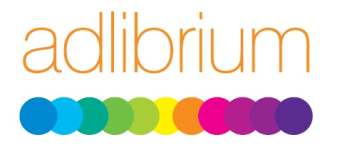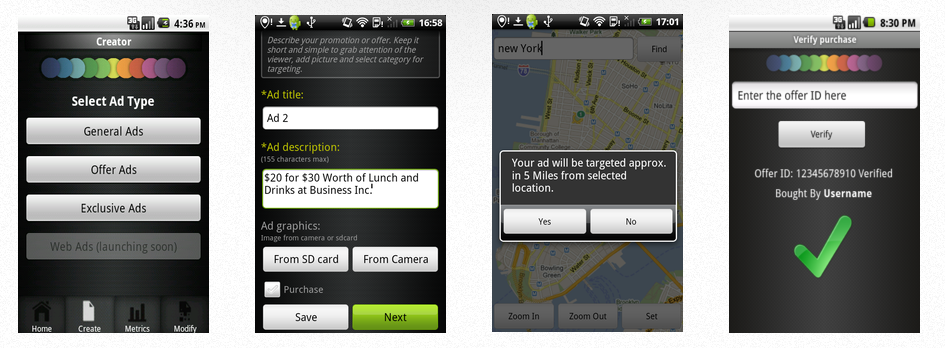Camber Tech, an advertising and social media startup founded in 2008, is officially revealing today that it has raised $1.5 million in seed capital from a host of international angel investors. The startup plans to use its recent infusion of capital to ramp up marketing efforts and continue cross-platform development of its mobile apps.
In early 2010, shortly after the devastating earthquake in Haiti, Camber Tech was invited to the Clinton Global Initiative, as the startup was at the time working on creating local web platforms in an effort to enhance access to commerce, journalism and media in conflict zones. Yet, because of local friction, both in language and business customs, the plan was dropped.
However, inspired by the incident, the startup remained determined to continue working on a realtime cause marketing solution that could have real global application, and help solve some big problems for local commerce along the way. After a few months of work, Camber Tech announced new a commitment with Former President Clinton to “help raise funds and awareness for non-profits and social causes through its mobile advertising platform over a six year period”.
So, with this new funding and a partnership with the Clinton Global Initiative in its pocket, Camber Tech has developed Adlibrium, a local mobile ad and marketing platform that runs on mobile devices — well, initially for free only on Android, with iOS coming in the near future, according to Camber Tech Co-founder and CEO Shaunak Khire.
Essentially the platform, which launches in private beta today, enables small, local businesses and merchants to easily and efficiently create ad and marketing campaigns, offer promotions, deals, and more. Adlibrium wants to encourage these SMBs, that may traditionally struggle to bring offline business online, to get all digital and start connecting and interacting with their customers via a critical access point: their ever-present mobile devices.
Through Adlibrium, merchants and local businesses can create fixed price and time-sensitive local offers and ad campaigns, so in a sense — for those familiar with the space — Adlibrium is a local commerce platform (in app form) that, at its core is a little bit of AdWords and instant offers, with a hint of Lockerz.
Except that, in the case of Adlibrium, one of the nifty features of its ad platform is that it offers businesses the ability to view analytics (like views, calls, location, purchases) and then take that data and use it for re-targeting — right up to the individual impression. Adlibrium enables transactions and verification by allowing merchants to punch in an ID, similar in conceit to GrouponNow, with the main difference being that Adlibrium takes no commissions.
By allowing customers to see an ad, make a purchase on a deal or offer based on that ad, and then allow merchants to track and analyze the data being produced by these interactions (to then allow future retargeting), Adlibrium is making a play at closing the redemption loop, an important goal for local commerce, which my colleague Erick Schonfeld recently wrote about in detail.
What’s more, the platform gives merchants the opportunity to serve three different types of ads or promotions to their customers: General ads (which are text-only); offers; and exclusive offers, which come in the form of, “own this location for a certain period of time”, for example. And distribution of these ads is totally opt-in for customers, which is a nice touch in that it allows customers some control.
For Adlibrium, the goal, then, is not only to offer campaigns that can be controlled in every aspect, be it gender, category, or location, but to work towards closing the redemption loop by allowing merchants to automatically enter customer data into their databases, thus allowing them easy future retargeting through loyalty cards, individual offers, etc.
The other cool feature that helps it go for the close: For every offer a user opts-into, they are rewarded with Adlibrium coins, which can then be redeemed at specific merchants or can be donated to a cause of their choice, so that users have actual cash incentive to donate the virtual currency in a philanthropic way.
This is obviously where the startup’s commitment with the Clinton Global Initiative enters into play, as it not only allows donation of virtual currency, but also gives non-profits a space within the merchant ad unit — if the merchant chooses to associate with a particular cause, of course. But, according to Shaunak, the merchants the team has spoken to thus far are excited about the opportunity to partner with non-profits, especially as they’re creating “cause-aware ads”, which make everyone involved feel a little bit better about online advertising.
Yet ads, coupons, and offers are just the first step for Adlibrium, Shaunak says. The next phase will be to roll out an app that targets advertising and marketing agencies, allowing them to take advantage of the same features available to merchants for their own brands, naturally spreading the reach of Adlibrium’s platform.
But how will the startup monetize its platform, you ask? Because Adlibrium operates on a DIY model, merchants and local businesses download the free app and, similar to Admob, set up an account balance of $10, $50, or $100, which then allows the business to create one of the three types of aforementioned ad campaigns. Adlibrium then charges merchants depending upon the level of targeting and campaign duration they choose. The offers and ads vary from $20 to $1,000, again depending on run-time and targeting.
While there are some fees, Adlibrium has established an interesting model that should be of interest to those local merchants that are wary of the Groupon model’s efficacy in retaining customers after the expiration of an offer or coupon. Because Adlibrium doesn’t charge commission, and provides businesses with sales and analytics metrics, they facilitate easier retargeting and (the hope is) greater retention than services like GrouponNow or LivingSocial Instant.
Camber Tech also recently joined the Mobile Marketing Association, a non-profit entity that represents more than 700 companies in the mobile marketing space. What’s more, Shaunak, at 21, became the youngest member of the MMA’s global board of directors. Not too bad for a 21-year-old.
Having received support from President Clinton and his global initiative, and with the promise of incentives to donate to non-profits and charities baked into the Adlibrium platform, the startup seems well positioned to become a player in the space. Though we’ll have to wait for the iOS apps before we jump to any major conclusions, of course.
For those readers looking to get an early taste of Adlibrium’s beta launch for merchants, click here and enter your email into the “early access” prompt.
And for more info on Adlibrium, check out the video below:

